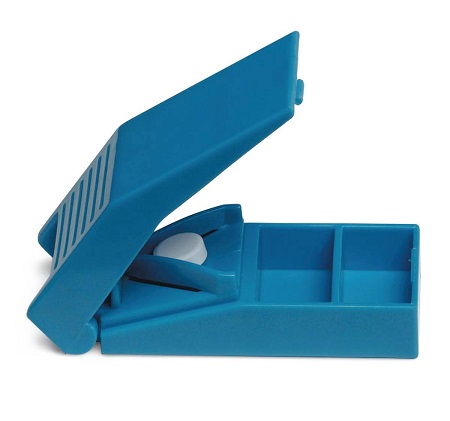
Pill splitting – literally cutting them in half – has long been a popular way to save on medication costs, but you always need to speak with your doctor or pharmacist first, because not all pills should be split.
The reason pill splitting is such a money saver is because of the way drugs are manufactured and priced. A pill that’s twice as strong as another may not be twice the price. In fact, it’s usually about the same price. So, buying a double-strength dose and cutting it in half may allow you to get two months’ worth of medicine for the price of one. But is it safe? If your doctor agrees that splitting your pills is okay for you, you learn how to do it properly, and you split only pills that can be split, there’s really no danger.
Ask Your Doctor
If you’re interested in splitting your pills, talk to your doctor or pharmacist to find out if any of the medicines you use can be safely split. It’s also important to find out whether splitting them will save you enough money to justify the hassle.
The pills that are easiest to split are those with a score down the middle. However, not every pill that’s scored is meant to be split. Pills that are most split are cholesterol lowering drugs, antidepressants, and high blood pressure medicines.
Use a Pill Splitter
Having the right equipment is very important too. Don’t use a knife or scissors to cut your pills in half. This can cause you to split them unevenly resulting in two pieces with very different dosages, which can be dangerous. Purchase a proper pill cutter that has a cover and a V-shaped pill grip that holds the pill securely in place. You can find them at most pharmacies for $5 to $10.
For convenience, you might be tempted to split the whole bottle of pills at once. But it’s best to do the splitting on the day you take the first half, and then take the other half on the second day or whenever you are scheduled to take your next dose. That will help keep the drugs from deteriorating due to exposure to heat, moisture, or air. It will also help ensure that any deviation in the size of one dose is compensated in the next. It’s also important to know that pills are only safely split in half, and never into smaller portions such as into thirds or quarters.
Don’t Split These Drugs
Some pills should never be split. Drugs that are time-released or long-lasting and tablets that contain a combination of drugs probably shouldn’t be split, because it’s difficult to ensure a proper amount of active ingredient in each half. Pills with a coating to protect your stomach, and pills that crumble easily or irritate your mouth shouldn’t be split either, along with chemotherapy drugs, anti-seizure medicines, birth control pills and capsules containing powders or gels.
Again, your doctor or pharmacist will know which drugs can and cannot be split. If you’re taking a medicine that can be split, you’ll need to get a prescription from your doctor for twice the dosage you need. Then you can start splitting and saving, safely.
Jim Miller publishes the Savvy Senior, a nationally syndicated column that offers advice for Boomers and Seniors.
Related Articles & Free Vermont Maturity Subscription

How to Handle Your Medicare Coverage if You Move
How to Replace Important Documents That Are Lost or Missing






Comment here